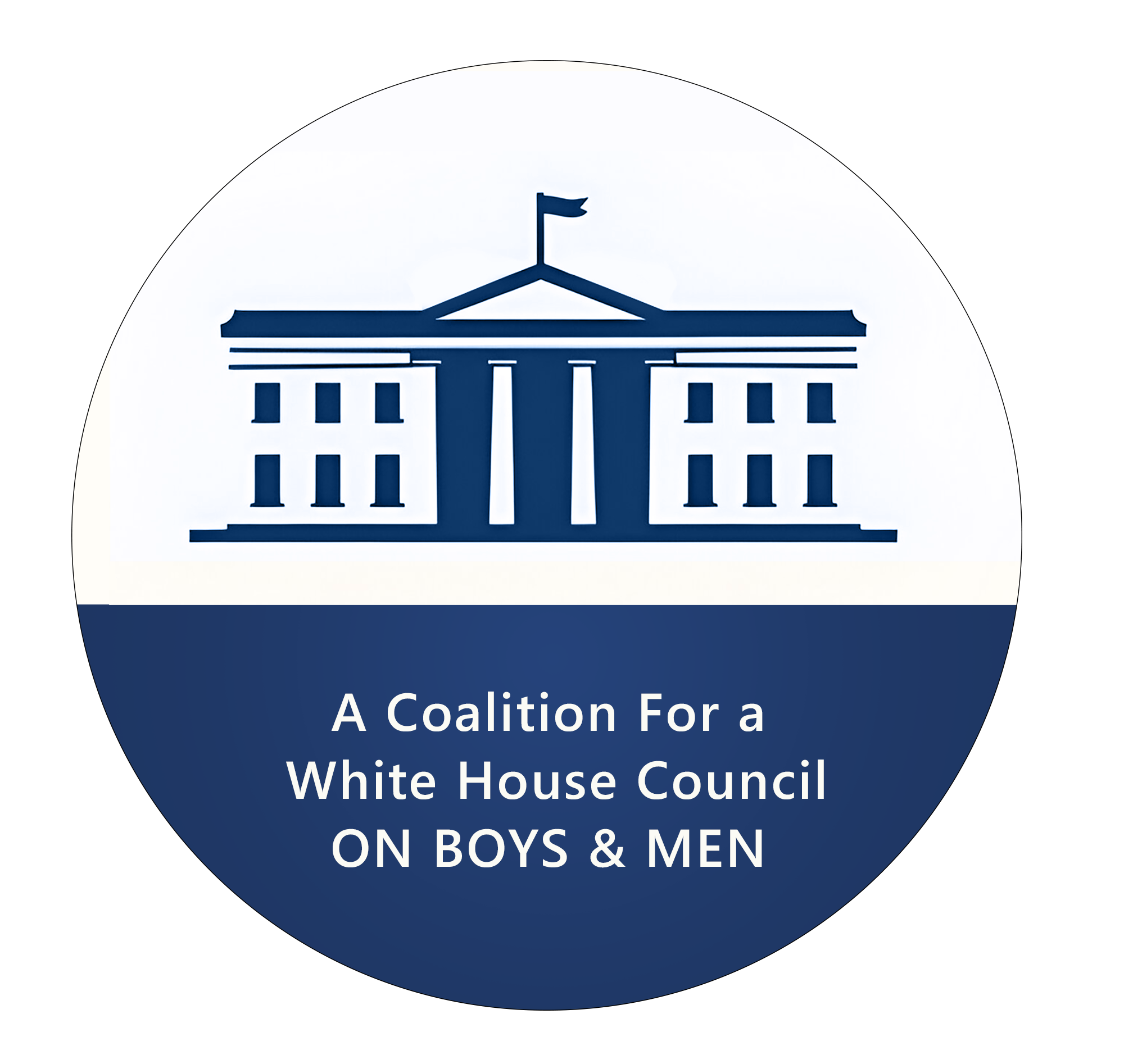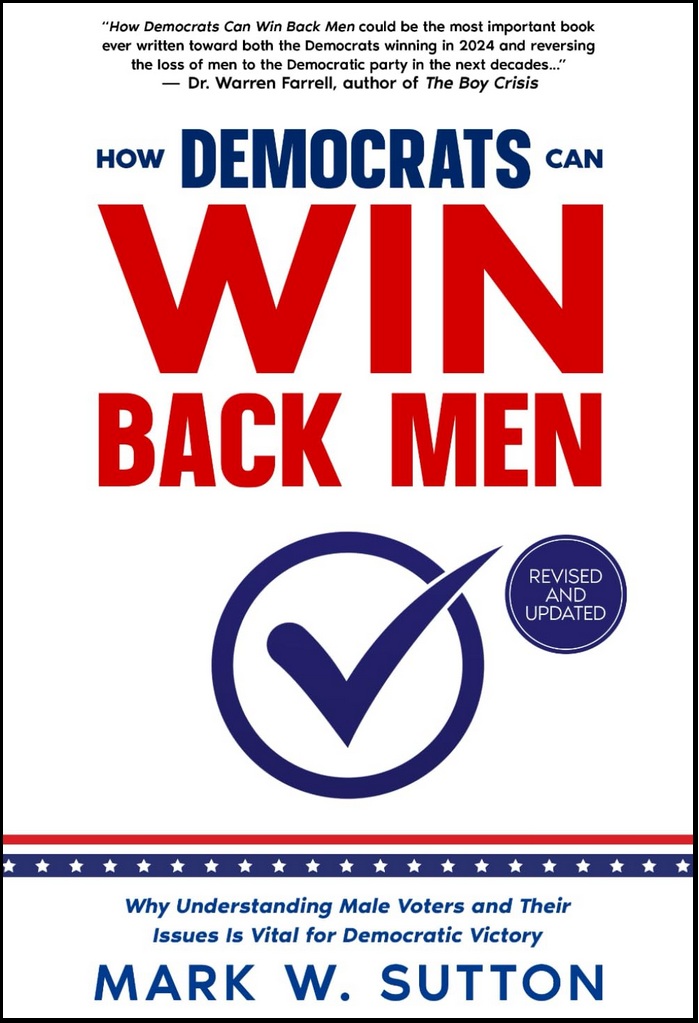
Mark W. Sutton is the author of How Democrats Can Win Back Men, available on Amazon. You also visit his site to connect to more of his writing at mark-sutton.com.
Examining 2024 Party Platforms
The Coalition formed in 2009 with the goal of convincing The White House, at that time occupied by President Obama, to create a Council for Boys and Men to serve as a complement to the one created for women and girls. Since that time, we have continued to advocate for such a council, regardless of the political party in power, and looked at each administration’s willingness to pay attention to the needs of boys and men.
As the 2024 election approaches, we look at the two major parties and examine their focus, or lack thereof, on issues affecting boys and men.
2024 Democratic Party Platform
On Monday, August 19, the Democratic Party released it’s official 2024 platform, and similar to its platform of 2016 and 2020, it again neglected to even mention important issues affecting our boys and men, such as 5.9 shorter life expectancies, poor educational outcomes, and high suicide rates, to name just a few possibilities.
I may be one of the few people who eagerly awaited the release of the 2024 Democratic Party Platform". I was hoping, against all odds, that the document might include at least a few references to some obvious and non-controversial men’s issues. Like, for instance, the fact that men are dying 5.9 years earlier than women. What is more important than life itself? Why not mention that the Democratic Party cares about male health and longevity? Or perhaps the fact that boys are struggling in education. Shouldn’t that be a talking point for Democrats who claim to care for education? Men are now only about 40% of college students. (There are many other men’s issues such as suicide, homelessness, and opioid overdoses; see Chapter 3 of my book How Democrats Can Win Back Men for a deeper dive on challenges boys and men are facing.)
But, it was not to be. Unfortunately, this document is even more neglectful of men than the 2020 and 2016 platforms. The platform appears to have been written with the assumption that Biden would be the Democratic nominee and was not edited to reflect the candidacy of VP Harris. It also follows the familiar pattern that I have noted in Biden’s messaging — his State of the Union Address, proposed budget, and other communications have consistently and completely ignored men, boys, and their legitimate issues.
Unbalanced: Democrats Ignore Men Again in 2024
I like to perform a word search to see how many times gender-specific words are mentioned. Here are the results from the 2024 Democratic Party Platform:
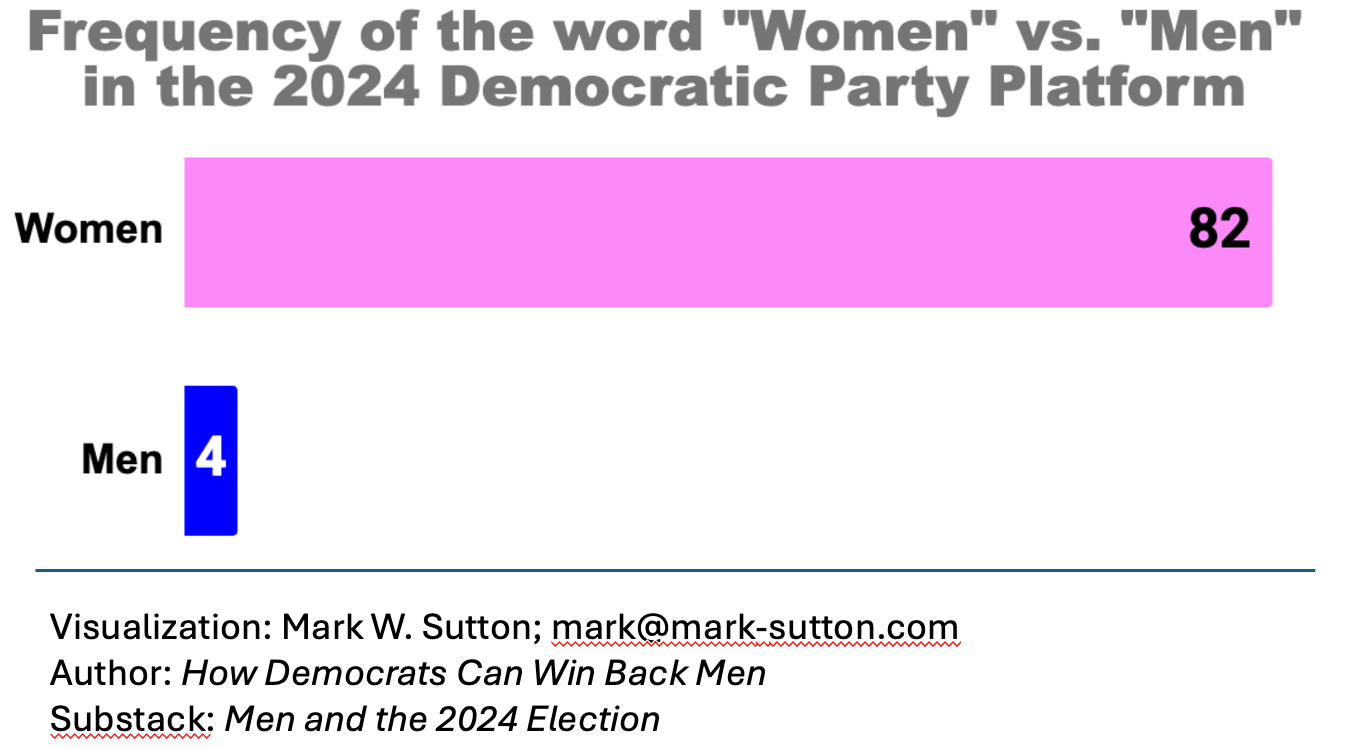
Three instances of the word men are in “men and women” phrases, so removing those, the numbers are:
Women: 79
Men: 1
These numbers are so lopsided that I don’t think we can call this unconscious bias, it’s just plain bias. It’s men’s issues that are being excluded from the platform.
The one remaining instance of the word “men” is criticizing Trump for hiring disproportionately male judges (p. 46). It’s a valid point, but not an issue that is focused on supporting the challenges that men are facing right now. There are numerous sections on women’s and girls’ issues such as abortion rights which I support 100% (p.48). I’m not suggesting they remove references to women and girls’ issues. However, it would be a stronger document if it were more balanced. Some other issues covered, such as LGBTQI+ issues (p.56), include a subset of men. There are some other strong points on renewable energy and environmental issues. However, there is absolutely nothing for men and boys specifically. That is unfortunate, and it’s both poor policy and strategy.
If you’re going to focus on issues that affect women and girls, it is only fair to focus on those legitimate issues that boys and men face, as well. And when you fail to do so, don’t be surprised when men vote for you at lower rates. It’s not complicated.
During the DNC, I listened to a live WAPO interview with Harris’ campaign manager Jennifer Dillon O’Malley who had also been running Biden’s campaign until he dropped out. She said, all voters should be able to “see themselves in the vision that the vice president is setting out…” (12:30). I found this comment so strange — the Democrats seem to be going literally out of their way to NEVER mention anything about boys and men. Democrats don’t mention men’s issues at all in the party platform, yet, I’m supposed to “see myself in the vision?” This is what I call the Democratic Disconnect with men, and it was on full display in this interview, at the DNC, and again in the 2024 Democratic Party Platform. I think the convention, overall, was a net positive for Democrats. But it was far from perfect, and the polling by gender shows that.
Democrats Still Trailing Significantly Among Men
I’ve been told by several readers that I was ahead of my time with my writing and research — the gender divide in voting has become a hot topic this year. Last weekend alone, here are two examples:
- Newsweek recently published an article entitled Trump vs. Harris Poised To Be Largest Gender Divide in Election History” that included similar ideas as my book How Democrats Can Win Back Men. It notes multiple polls that show a continuation of the large gender voting gap. It refers to the Times/Siena poll from July 22-24 that shows men at -17% among Dems, and women at +14%, a 31% gap. The numbers may have improved somewhat since that poll, but Democrats are likely still trailing significantly among male voters. (Thanks to a reader from Virginia for sending!) Author Martha McHardy quotes Jackson Katz, PhD, who says:
I have long argued that the Dems need to respond to this aggressively and speak directly to men, including young men, and say 'we see you, we hear you and we care about you.'
Given that the gender voting gap may be large, and that Harris is trailing among men to Trump by a whopping 17%, shouldn’t they plan to close that gap by getting more men’s votes by speaking to them directly, while of course continuing to seek support among women? That seems like an obvious strategy that the party, particularly members of the platform committee and planners of the DNC, is apparently unaware of or for some reason unwilling to pursue. - Maureen Dowd’s New York Times article on Palantir founder Alex Karp. (Thanks to a reader from Marin for sending this in!) Dowd writes:
Mr. Karp concurred with his friend Mr. Carville on the problem of drawing men to the Democratic Party, saying, “If this is going to be a party complaining about guys and to guys all the time, it’s not going to succeed.”
And later Dowd quotes Karp him again:
The unfortunate fact here is that this election is really going to turn on ‘What percentage of males can the Democrats still get?’
I’m not sure why the fact is “unfortunate,” but it’s nice to know a billionaire genius like Karp sees the importance of the male vote for Democrats. The subtitle of my book is Why Understanding Male Voters and Their Issues is Vital to Democratic Victory. As my analysis of exit polls reveals, since 1972, the modern era, Democrats have never lost an election when they have done equal to or better than -8% among men. And conversely, they have never won when they have lost men by more than 8%. I’m calling this fact Sutton’s Key, as it is a major key to the election.
I’m perplexed as to why the Democratic Party cannot put 2 and 2 together here. I’m not suggesting that there needs to be an exactly even word count in the Party Platform to attract men. In fact, I’m sure most voters don’t even read the platform. However, the document is important as it sets the tone for the party nationally, and some men generally get the sense that Democrats don’t care about them. That attitude was apparent at the convention where again, men’s issues weren’t discussed, at least in any of the speeches I heard.
Men and the DNC
Harris only had one brief mention of men in her discussion of reproductive rights. As I and others have said, men have reproductive rights as well. While of course abortion rights, just one category of reproductive rights, affect women most directly, there are numerous things from IVF to nonconsensual paternity that affect men. In her DNC acceptance speech, regarding “reproductive freedom,” Harris said:
Well, I will tell you, over the past two years, I’ve traveled across our country, and women have told me their stories. Husbands and fathers have shared theirs.
It was good to hear at least one inclusive mention of men by Harris. Walz, of course, also spoke to that while accepting the VP nomination. I wouldn’t be surprised if it was Walz’s own experience that informed that particular line in Harris’s speech. Walz’s speech also appealed to men in some ways, I believe. For instance, he referred to his time as a football coach and urged Democrats to “leave it [all] on the field.” He appealed to moderate or even conservative men with the line, “Look, I know guns. I'm a veteran. I'm a hunter, and I was a better shot than most Republicans in Congress and I got the trophies to prove it.” And of course, Walz projects a positive image as a father and husband and had that touching moment where his son Gus shouted, “That’s My Dad!” which I wrote about in my post last week. But that appeared to be a spontaneous moment of joy, a beautiful one, rather than a carefully crafted talking point focused on men.
Other than the lack of attention to men’s and boys’ issues, I was impressed by both Harris and Walz, as well as many of the Democratic speakers. These folks are professional orators, and it showed. Talk about pressure…they all handled it well. I thought Harris hit on a great many of the other important themes in a way that Biden had been unable to. Polling, while still indicating a toss-up, is much better today than it was for Democrats last month.
Of course there are issues like the economy, inflation, jobs, and the Middle East that affect everyone, and men care about these, too. But Democrats still trail significantly among male voters, and the Democrats’ messaging didn’t do anything to address that deficit specifically, which I believe was a mistake.
2024 Republican Party Platform
In 2020, the Republican Party reused it’s 2016 document, so this is the first new Republican platform in eight years. The 2024 Republican Party Platform is available on the Republican Party website.
The document is dedicated to: “To the Forgotten Men and Women of America.” So right up front, the Republican’s at least offer a statement of inclusivity. As our coalition knows, there are indeed a lot of men and boys who feel forgotten by our government, so acknowledging this at least speaks to many people who feel their views are not being reflected in government policies.
The platform then lists 20 promises, only one of which is related to gender. The topic is gender identity and the developing issue of trans athletes and students at college. Number 17 says, “KEEP MEN OUT OF WOMEN’S SPORTS” (capitalization in original). Ten chapters follow, with another mention of this issue in Chapter 9, Section 5:
“5. Republicans Will End Left-wing Gender Insanity
We will keep men out of women’s sports, ban Taxpayer funding for sex
change surgeries, and stop Taxpayer-funded Schools from promoting gender transition, reverse Biden’s radical rewrite of Title IX Education Regulations, and restore protections for women and girls.”
So this isn’t really a men’s issue per se, and it is framed as protecting women.
In total the word count for gender related terms is less and more balanced than the Democratic Platform:
Men: 5
Women: 6
Three of these are in the context of the phrase, “men and women, ” leaving:
Men: 2
Women: 3
These remaining instances are all connected to the aforementioned gender/sports issues, and that’s all the mentions of men and women in the document.
One final point is that many people feel that the Republican Platform was intentionally leaving out key goals that are instead included in the so-named “Presidential Transition Project,” Project 2025. This project is much more thorough and gets into many more specific issues than the Republican Platform.
Conclusion
Rather than focusing on one gender over another, the Republican Platform wants to make clear the distinction between male and female, but otherwise does not go out of its way to focus on the issues of men or women specifically, unlike the Democratic Platform which does so for women but not men. The Democratic Platform has numerous issues for women and girls, and for some subsets of men and boys such as the LGBTQI+ community, but none for men and boys as a whole.
Despite the major challenges facing boys and men today, neither party has made any indication that it plans to create a White House Council on Boys and Men or similar type of body at the national level.

A silent crisis in men’s health gets worse
Across the life span -- from infancy to the teen years, midlife and old age -- boys and men are more likely to die than girls and women
The Washington Post, April 17, 2023
A silent crisis in men’s health is shortening the life spans of fathers, husbands, brothers and sons.
For years, the conventional wisdom has been that a lack of sex-specific health research mainly hurts women and gender minorities. While those concerns are real, a closer look at longevity data tells a more complicated story.
Across the life span — from infancy to the teen years, midlife and old age — the risk of death at every age is higher for boys and men than for girls and women.
The result is a growing longevity gap between men and women. In the United States, life expectancy in 2021 was 79.1 years for women and 73.2 years for men. That 5.9-year difference is the largest gap in a quarter-century. (The data aren’t parsed to include differences among nonbinary and trans people.)
The longevity gap between men and women is a global phenomenon, although sex differences and data on the ages of greatest risk vary around the world and are influenced by cultural norms, record keeping and geopolitical factors such as war, climate change and poverty.
The Boy Crisis: Why Our Boys Are Struggling and What We Can Do About It.
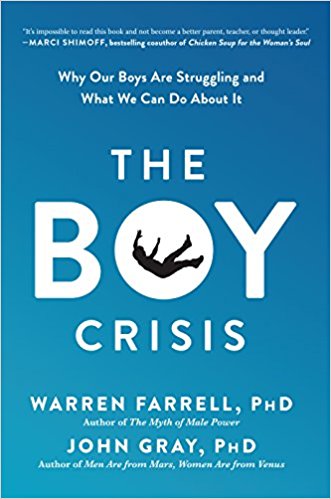

WHAT IS THE BOY CRISIS?
It’s a crisis of education. Worldwide, boys are 50 percent less likely than girls to meet basic proficiency in reading, math, and science.
It’s a crisis of mental health. ADHD is on the rise. And as boys become young men, their suicide rates go from equal to girls to six times that of young women.
It’s a crisis of fathering. Boys are growing up with less-involved fathers and are more likely to drop out of school, drink, do drugs, become delinquent, and end up in prison.
It’s a crisis of purpose. Boys’ old sense of purpose—being a warrior, a leader, or a sole breadwinner—is fading. Many bright boys are experiencing a “purpose void,” feeling alienated, withdrawn, and addicted to immediate gratification.
So, what is The Boy Crisis? A comprehensive blueprint for what parents, teachers, and policymakers can do to help our sons become happier, healthier men and fathers and leaders worthy of our respect.
Of Boys and Men: Why the Modern Male Is Struggling, Why It Matters, and What to Do about It
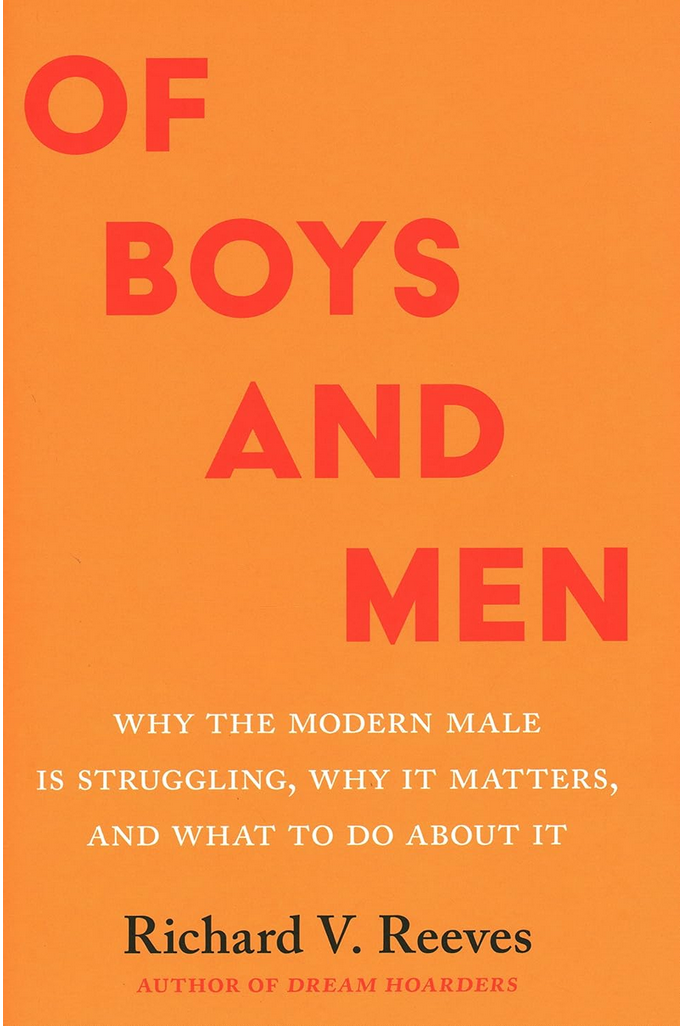

The Book that Sparked a National Conversation
A Barack Obama 2024 Summer Reading Selection
An Economist Best Book of 2022
A New Yorker Best Book of 2022
Boys and men are struggling. Profound economic and social changes of recent decades have many losing ground in the classroom, the workplace, and in the family. While the lives of women have changed, the lives of many men have remained the same or even worsened.
In this widely praised book, Richard Reeves, father of three sons, a journalist, and now the president of the American Institute for Boys and Men, tackles the complex and urgent crisis of boyhood and manhood. He argues that our attitudes, our institutions, and our laws have failed to keep up. Conservative and progressive politicians, mired in their own ideological warfare, fail to provide thoughtful solutions.
Reeves looks at the structural challenges that face boys and men and offers fresh and innovative solutions that turn the page on the corrosive narrative that plagues this issue. Of Boys and Men argues that helping the other half of society does not mean giving up on the ideal of gender equality.
